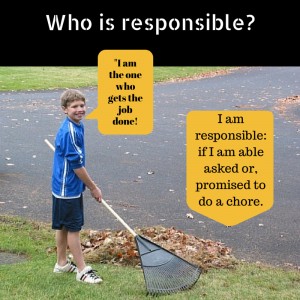 In our quest to be responsible adults and to assist our children to do the same – we have to ask ourselves what does a responsible adult do, what would be a sign that they are responsible? For me one of the standout qualities is punctuality . Maybe that comes from being an employer for the past 34 years or maybe it was something that my own parents were very insistent on. For an example, I remember having arranged for a ride to an event as a child and my parents not only insistent on being ready – but also be sitting at the window watching for the ride to arrive.
In our quest to be responsible adults and to assist our children to do the same – we have to ask ourselves what does a responsible adult do, what would be a sign that they are responsible? For me one of the standout qualities is punctuality . Maybe that comes from being an employer for the past 34 years or maybe it was something that my own parents were very insistent on. For an example, I remember having arranged for a ride to an event as a child and my parents not only insistent on being ready – but also be sitting at the window watching for the ride to arrive.
Everyone appreciates the punctual person. Employers for sure, but employees too – especially if they work at a job like a fireman who is dependent on the relief shift to be on time or they cannot leave their post. In addition though parents and teachers appreciate it when chores or assignments are completed when they are assigned on time. Who has ever been in an audience when a speaker was late arriving or worst did not stop talking when their time was up.
How do we build that quality of punctuality into who we are?
We may have to admit first that we need to work on this trait. Many believe that if they are just a couple of minutes late it is not a big deal. As one instructor said to me, 10 minutes before the appointed time is on time, being on the dot is late. Imagine how much time is lost in the workforce when people “start work” at 10 by arriving and then fixing their coffee, having a bit of breakfast, say hi to their workmates and then sit down to do what they were hired to do? Even if you got all of that done in 12 minutes – that is one hour a week or 52 hours a year more than a full week of work.
That attitude is not respectful of those around you. It says to others, “You can wait for me, because I am more important than you.” This sort of attitude hurts everyone in line with you on a project, with others waiting for your part to be complete so they can finish their part and pass it on to the next person to contribute their part.
Being on time for whatever the event or the assignment is most of the time requires that we demonstrate self control and be realistic about the time it will take to complete a task. Allowing many things to be started or not started on time can make the difference on the deadline we might have. Controlling our own desire to start something new or put off preparation will help us to be on time for other commitments.
Even more difficult for many of us is the ability to be real about how long it will take to complete a given part of the project. Almost every task we attempt may involve more time, research or have its own interruptions that delays our being punctual.
Teaching children to be punctual is done in our 3 step process.
- Establish punctuality as an expectation, a core value or at least a part of our requirement to demonstrate responsibility.
- Role model this character trait for our children
- Teach our children with establishing routines with them of preparation, (getting ready for school, ready for bed, departing ahead of the minimum) and insisting on it around the home.
Doing these things is a great start in teaching our children to be responsible (doing what is required, needed or expected of us) adults.





